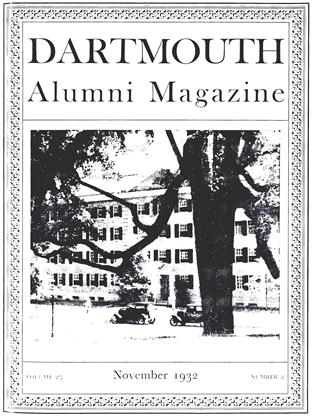an Essayon Henry Williamson. By HerbertFaulkner West. The Ulysses Press Ltd.London, 1932.
You may have seen it in one of the Hanover book stores, a slender green volume, called, intriguingly enough, "The Dreamer of Devon." With its announcement "This entire Edition is limited to 250 copies," published by the Ulysses Press, it has that air of potential scarceness which makes so many book collectors unknot their purse strings.
If Henry Williamson, the dreamer, if Devonshire, and if the amenities of prognostications about limited editions seem too remote, the volume may be brought back home to Hanoverians and to Dartmouth men by the dedication to Professor W. K. Stewart and by the name of the author, Assistant Professor H. F. West of the Department of Comparative Literature.
The title sets the tone as you would expect. The little essay of thirty-five pages is a labour of love and is willing to stand on its ability to sketch in brief paragraphs Mr. Williamson and his study, his old three-legged round-top walnut table, his fireplace, his bookcases filled with his bestloved poetry and fiction, and, surprisingly, since Mr. West expressly states that Mr. Williamson lives "as Thoreau lived at Walden Pond in his own silences amid quiet lovely surroundings," his radio and his Silver Eagle sports car which he drives at eighty miles an hour down hill "and over cliffs," to borrow Mr. Williamson's own racy phrase.
It is a labour of love not only for the man with his two-and-a-half ounce fishing rod, his gumboots, and his Burberry, his passion for otters and his hatred for herons standing nonchalantly on one leg and scything trout with their beaks, but also for England and North Devonshire and Mr. Williamson's house "Shallowford," built with robust English strength, walls two feet thick of mud and straw, thatched in Elizabethan and village style. In the dining room stands solidly the oak refectory table well rubbed and highly polished as indeed it ought to with two gallons of linseed oil under its surface.
In these surroundings Mr. West heard Mr. Williamson talk of books and authors and "of other subjects men of the same age and with like interests discuss in confidence." They played "the grand passionate music of the third act of Tristan andIsolde," which threw them into a bit of a sombre mood. To make the adjustment to a note of hearty fellowship, they played records made "by the playboy of New York, Rudy Vallee, whose crooning voice Williamson liked and had heard in a New York night club the year before." And afterwards with the help of a crow-bar, a pick-axe, and five-hundred pound bags of gravel concrete they dammed a brook to make a trout pool.
The spirit of fraternal intimacy in which the book is written naturally excludes any critical efforts. It is enough to conjure up against the Devon scene the "Dreamer of Devon," brown eyes flashing, tall, thin with a wiry muscularity, dark hair greying along the sides, striding impulsively up and down the room.
Or perhaps Mr. West would rather have it said, as he himself wrote in dedicating his book to a friend, "If this essay serves to recall to you the green freshness of England, the high sense of honour of its citizens, its great tradition in nature writing (White, Waterton, Walton, Borrow, Edward Thomas, Richard Jefferies, Hudson (the master) and Henry Williamson), the purpose in writing it will more than be achieved."
 View Full Issue
View Full Issue
More From This Issue
-
 Article
ArticleTHE PERSONALITY OF WEBSTER
November 1932 By Claude M. Fuess -
 Article
ArticleHANOVER BROWSING
November 1932 By Rees Higgs Bowen -
 Sports
SportsTHIS GAME OF FOOTBALL
November 1932 By Edwin B. Dooley -
 Article
ArticleEditorial Comment on the Opening Address
November 1932 -
 Article
ArticleTHE CLASS OF 1936
November 1932 By E. Gordon Bill -
 Class Notes
Class NotesClass of 1930
November 1932 By Albert I. Dickerson
Books
-
 Books
BooksProfessor William J. Rose
MARCH 1930 -
 Books
BooksNutrition and Growth in Children
November, 1922 By F .P. L. -
 Books
BooksMARRIAGE.
NOVEMBER 1962 By FRANCIS E. MERRILL '26 -
 Books
BooksTHE MOST AMAZING BUT TRUE.
JUNE 1966 By JOHN HURD '21 -
 Books
BooksVEXED AND TROUBLED ENGLISHMEN 1590-1642.
JULY 1968 By RUSSELL A. FRASER '47 -
 Books
BooksADVENTURES IN WORLD LITERATURE.
June 1937 By Stearns Morse

